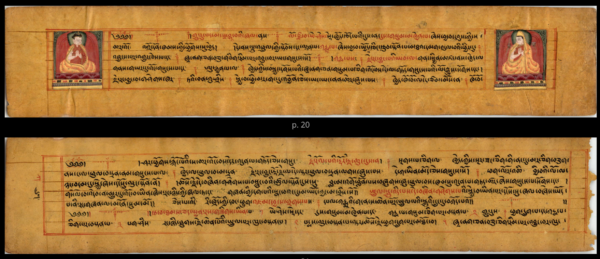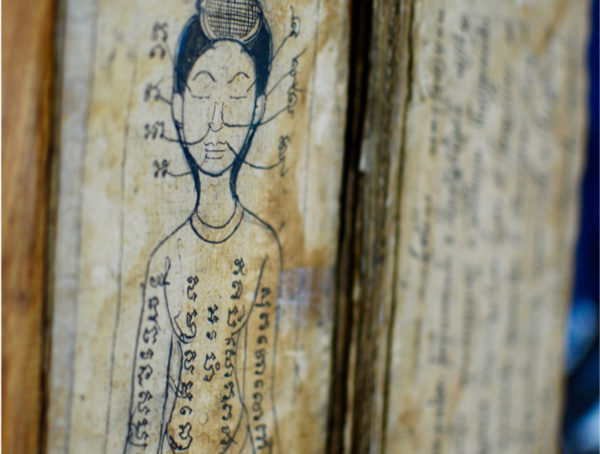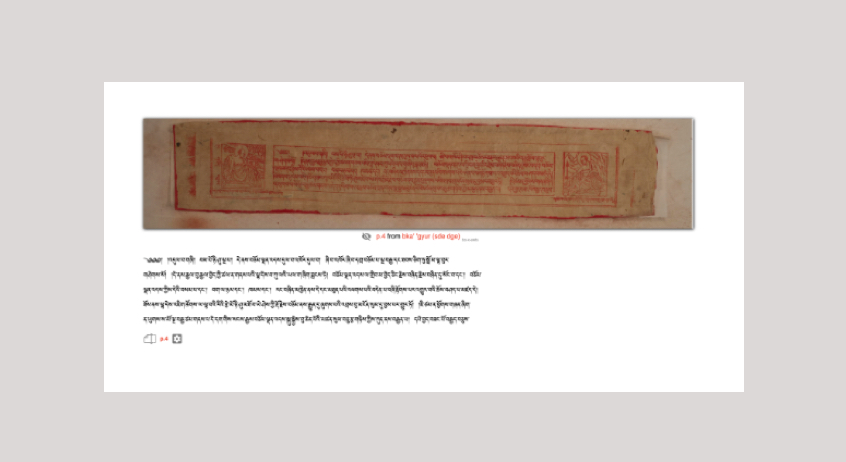BDRC digitizes endangered Buddhist manuscripts for long-term preservation and creates digital tools to support access and research.

BDRC digitizes endangered Buddhist manuscripts for long-term preservation and creates digital tools to support access and research.
Current programs focus on the preservation of Tibetan literary heritage, the preservation of manuscripts in Southeast Asia, and the development of technology to support digital archiving and scholarly research.
BDRC's preservation and access programs enact the organization's central aims: to repatriate the heritage of Buddhist cultures, make Buddhist literature available on a mass scale, and promote research on and engagement with culturally significant Buddhist texts.
| Preservation | Access | |
|---|---|---|
| Technology | BDRC uses advanced archival technology to ensure the longterm preservation of texts. | BDRC's technology initiatives promote access to texts by creating new research tools. |
| Scholarship | BDRC identifies and prioritizes texts for preservation with guidance from its network of scholars. | BDRC makes texts accessible by creating detailed metadata for the texts in its archive. |
BDRC has ongoing operations to digitize vulnerable manuscripts and block prints in China and India, and modern Tibetan publications in China.
These modern publications, supported by the Government of China, are often only available for a short time, and printed in small batches. BDRC's Tibetan program digitally preserves this important material. The Buddhist Digital Resource Center proudly carries on the legacy of its founder Gene Smith with a deep commitment to making Tibetan texts available to all, for all time.

Pages from the only known copy of the Collected
Works of Minyak Jamyang Drakpa, a 14th-century
scholar from Minyak, Kham.
BDRC Work ID: W2PD20096.
mkhas pa'i tshul la 'jug pa'i sgo/ (BDRC Resource ID: W8LS19999)
as viewed on the new BUDA site in Reading
View mode (above).
BDRC has ongoing operations to digitize vulnerable manuscripts and block prints in China and India, and modern Tibetan publications in China.
These modern publications, supported by the Government of China, are often only available for a short time, and printed in small batches. BDRC's Tibetan program digitally preserves this important material. The Buddhist Digital Resource Center proudly carries on the legacy of its founder Gene Smith with a deep commitment to making Tibetan texts available to all, for all time…
Buddhist texts in Southeast Asia are highly endangered, and preservation efforts are generally underfunded and limited. Many collections in Southeast Asia are under constant threat; manuscripts are disappearing at a rapid rate. The humid climate is particularly damaging to palm-leaf texts, which were historically the dominant format for Buddhist manuscripts in the region, and improper storage places these irreplaceable works in imminent peril.
Other threats abound as well—theft, neglect, fire, and insects all contribute to the destruction of the literary heritage of Southeast Asia. BDRC's text preservation program aims to protect these cultural treasures from being lost forever.
BDRC currently runs two major text preservation projects in Southeast Asia. Its longest-running Southeast Asia program, the Fragile Palm Leaves Digitization Initiative, is based at an archive in Thailand. The collection, assembled by the prominent scholar Peter Skilling, consists of 10,896 Burmese-style palm-leaf manuscripts and approximately 5,000 manuscripts in a variety of other formats and languages.
BDRC is undertaking the digitization of the entire archive. The Fragile Palm Leaves Digitization Initiative is generously supported by Khyentse Foundation.
Buddhist texts in Southeast Asia are highly endangered and preservation efforts are generally underfunded and quite limited. Many collections in Southeast Asia are under constant threat and manuscripts are disappearing at a rapid rate. The humid climate is particularly damaging to palm-leaf texts, historically the dominant format for Buddhist manuscripts in the region, and improper storage places these irreplaceable works in imminent peril.
Other threats abound, as well—theft, neglect, fire, and insects all contribute to the destruction of the literary heritage of Southeast Asia. BDRC's text preservation program aims to protect these cultural treasures from being lost forever.
BDRC currently runs two major text preservation projects in Southeast Asia. Its longest-running Southeast Asia program, the Fragile Palm Leaves Digitization Initiative, is based at an archive in Thailand. The collection, assembled by the prominent scholar Peter Skilling, consists of 10,896 Burmese-style palm-leaf manuscripts and approximately 5,000 manuscripts in a variety of other formats and languages.
BDRC is undertaking the digitization of the entire archive. The Fragile Palm Leaves Digitization Initiative is generously supported by Khyentse Foundation.

Late 19th-century Khmer manuscript on bark-pulp paper, folded in an accordion or leporello arrangement, showing Pali syllables linked to different parts of the body for meditation practice.
BDRC's second major preservation initiative in Southeast Asia is the Khmer Manuscript Heritage Project. With the assistance of L'Ecole française d'Extrême-Orient and Digital Divide Data, BDRC is digitizing and making accessible thousands of Khmer manuscripts.
Cambodia's manuscript heritage is a priceless storehouse of Khmer cultural knowledge, Buddhist scholarship, and artistic achievement. For hundreds of years Cambodia's traditional manuscripts conserved and transmitted Khmer literature, history, science, religion, medicine, and more. Sadly, a large number of these texts—95% to 98% of the country's traditional manuscripts—were destroyed during the tumultuous 1970s and 1980s.
As a result, much of the knowledge contained in those manuscripts was lost, dealing a blow to Cambodia's rich cultural heritage. The Khmer Manuscript Heritage Project will secure digital copies of the surviving texts for the benefit of future generations and make them freely available to all.

Khmer Manuscript
BDRC's second major preservation initiative in Southeast Asia is the Khmer Manuscript Heritage Project. With the assistance of L'Ecole française d'Extrême-Orient and Digital Divide Data, BDRC is digitizing and making accessible thousands of Khmer manuscripts. Khmer literary heritage is the storehouse of thousands of years of Cambodian cultural knowledge and artistic accomplishments. For hundreds of years Cambodia's traditional manuscripts conserved and transmitted Khmer culture, history, science, religion, medicine, and more. Sadly, a large number of these texts — 95% to 98% of the country's traditional manuscripts — were destroyed during Cambodia's civil war.
Consequently the knowledge contained in those manuscripts was lost, dealing a blow to the cultural heritage of the country. The Khmer Manuscript Heritage Project will secure digital copies of the surviving texts for the benefit of future generations and make them freely available to all.
In all of its programs BDRC holds itself to high ethical standards in terms honoring the wishes of the local communities and partners we work with, by respecting privacy and intellectual property, not being involved in the illicit trade in manuscripts, combating trafficking in persons, etc.
In all of its programs BDRC holds itself to high ethical standards in terms honoring the wishes of the local communities and partners we work with, by respecting privacy and intellectual property, not being involved in the illicit trade in manuscripts, combating trafficking in persons, etc.
BDRC promotes research on and engagement with Buddhist texts through the creation of digital tools and the development of archival technology.
BDRC has created a robust ontology designed for the archiving of Buddhist texts and has implemented a Linked Open Data structure that provides deep access to BDRC resources.
Through this technology, BDRC has started connecting digital projects with resources relevant to the Buddhist community and is fostering a global network of Buddhist digital archives.
BDRC makes its open-source resources available via its GitHub repository and encourages users to freely share and adapt its software.
It also regularly publishes Tibetan-language education courses to support textual analysis and support research efforts on the vast Tibetan corpus undertaken by the Tibetan and the Tibetan Studies communities.

An e-text in BDRC's archive as seen on BUDA's new reader with the corresponding scanned page above.
BDRC promotes research on and engagement with Buddhist texts through the creation of digital tools and the development of archival technology.
BDRC has created a robust ontology designed for the archiving of Buddhist texts and has implemented a Linked Open Data structure that provides deep access to BDRC resources.

An e-text in BDRC's archive as seen on BUDA's new reader with the corresponding scanned page above.
Through this technology, BDRC has started connecting digital projects with resources relevant to the Buddhist community and is fostering a global network of Buddhist digital archives and tools.
BDRC makes its open-source resources available via its GitHub repository and encourages users to freely share and adapt its software.
It also regularly publishes Tibetan-language education courses to support textual analysis and support research efforts undertaken by the Tibetan community on the vast Tibetan corpus.